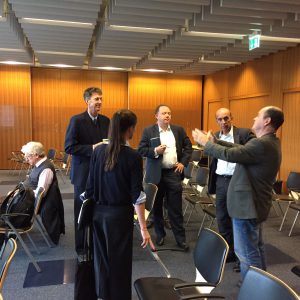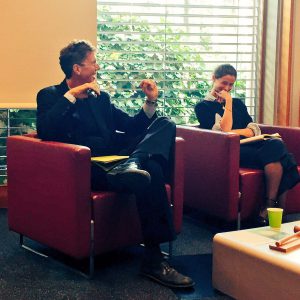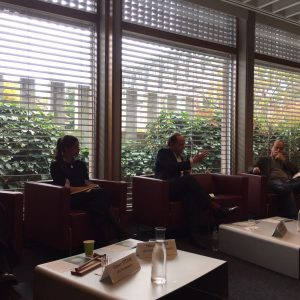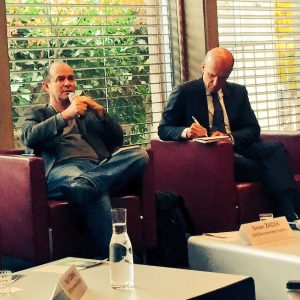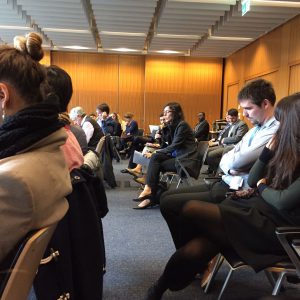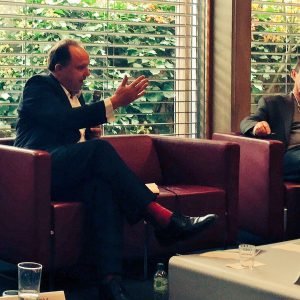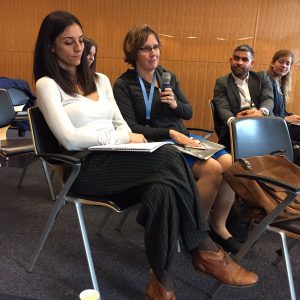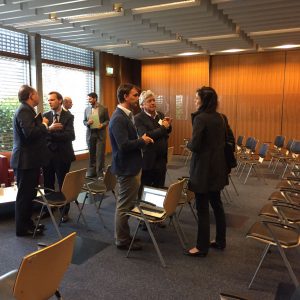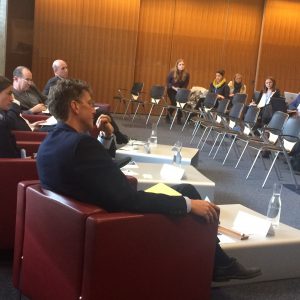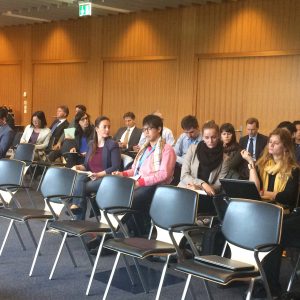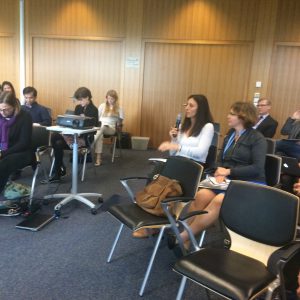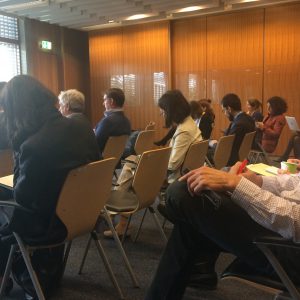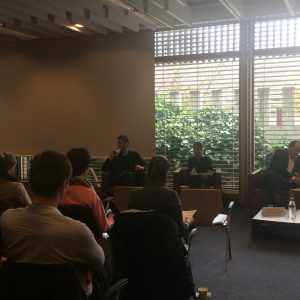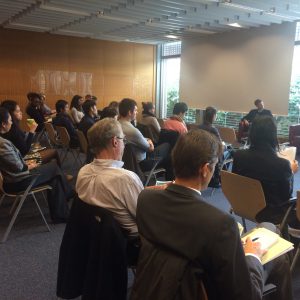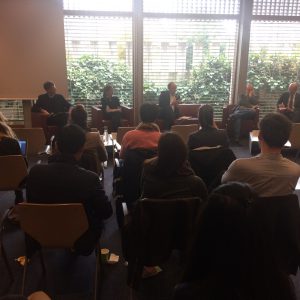Événement
Greening the Financial System: From Momentum to Transformation
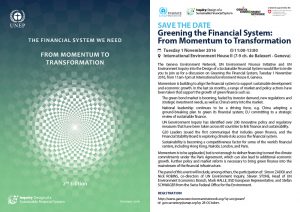
01 Nov 2016
11:00–13:00
Organisation: Geneva Environment Network
A discussion on Greening the Financial System, organized within the framework of the Geneva Environment Network, took place on Tuesday 1 November 2016, at International Environment House II, Geneva.
Momentum is building to align the financial system to support sustainable development and economic growth. In the last six months, a range of market and policy actions have been taken that support the growth of green finance such as:
- The green bond market is booming, fuelled by investor demand, new regulations and strategic investment needs, as well as China’s entry into the market.
- National leadership continues to be a driving force, e.g. China adopting a ground-breaking plan to green its financial system; EU committing to a strategic review of sustainable finance.
- UN Environment Inquiry has identified over 200 innovative policy and regulatory measures that have been taken across 60 countries to link finance and sustainability.
- G20 Leaders issued the first communiqué that includes green finance, and the Financial Stability Board is exploring climate risks across the financial system.
- Sustainability is becoming a competitiveness factor for some of the world’s financial centres, including Hong Kong, Nairobi, London, and Paris.
Momentum is to be applauded, but is not enough to deliver financing to meet the climate commitments under the Paris Agreement, which can also lead to additional economic growth. Further policy and market reform is necessary to bring green finance into the mainstream of the financial infrastructure.
The panel of this event included, among others, the participation of: Simon ZADEK and Nick ROBINS, co-directors of UN Environment Inquiry, Steven STONE, Head of UN Environment Economics Branch, Felicity Perry, UN Environment Inquiry, and Stefan SCHWAGER from the Swiss Federal Office for the Environment.
Summary
WELCOMING REMARKS
In his welcoming remarks, Steven Stone, the Chief of the UN Environment Economics and Trade Branch, introduced the topic of the interactive dialogue. He raised the question of the financing of the upcoming internationally-agreed objectives, namely the implementation of the Sustainable Development Goals (SDGs) and the Paris Agreement. In this regard, he emphasised on the diversity of the field and explained how more and more institutions and agencies are currently getting involved. The report of UN Environment Inquiry, The Financial System We Need, was published in 2015 at the International Monetary Fund and World Bank annual meetings. On January 2016, the G20 Green Finance Study Group met for the first time in Beijing, China. Today, there is a chance to look back to what was accomplished and what was learnt during the journey, and reflect on what can now be done. Steven thus asked two questions to the panel: “How can we build on that momentum to create transformation?” and “How do we get the finance to shift into the kind of development and activities that we want?”.
INTERACTIVE DIALOGUE
Nick Robins, from UN Environment Inquiry, explained further where this momentum was originating from. First an employee at HSBC, he left the banking system during the financial crisis in 2008 to join UN Environment. In the following years, there was a phenomenon of recognition of the need for re-regulation, accompanied by global, voluntary regulatory framework on bank capital adequacy, stress testing, and market liquidity risk called Basel III. This framework sought to make it more profitable to invest in long term non-liquid projects. However, it remained completely disconnected from the topics of sustainable development.
Nick explained there was a need to think about how we were going to design the financial system in order to contribute to sustainable development. So far, the financial system has rarely been thinking systematically about key sectors and actors which need to be involved. An agenda needed to be drafted. In order to provide an answer to these inadequacies, Nick Robins and his colleagues started as a two-years initiative: the UN Environment Inquiry. He described their work as a process of innovation, seeking to understand how social, market and policy innovation could possibly contribute to green finance. They started focusing on the relationships between international frameworks – mainly non-binding – and national regulations, on how different countries considered green finance and on how is innovation was conducted.
Nick explained how fast the financial world was evolving. As an example he said that today, the financial stability board was focusing on climate change, which would have been unthinkable just a year ago. Many financial centres such as Nairobi, London and Hong Kong are getting involved in green finance. While a lot of people were sceptic at the beginning, he explained a sense of community has now been created. He urged the need to use this movement of change in order to tackle our current sustainability goals, as for the moment being, financial flows were not consistent with SDGs and the Paris Agreement.
Simon Zadek, also a member of the UN Environment Inquiry team, further insisted on the recent accelerations in the financial world. Within the past two years, he explained, significant progress has been made, as UN agencies, financial places and governments suddenly started speaking about green finance.
Simon emphasised the importance of the narrative in shaping a conventional wisdom. He described it as a fundamental pre-condition to system change. He explained how the financial system was increasingly functioning successfully within its own terms without serving the purpose of financing green economy, and how this needed immediate action. In his words, it would be easier to green a broken financial system rather fixing a system that is working well. He stressed the need to identify what will make the financial system shift the direction that interests us all.
To illustrate his sayings, Simon gave a few examples. He first mentioned how western countries had leveraged the power of China in the past 24 months. Indeed, by the time of the G20 leaders’ summit in October 2016, China had embraced 35 recommendations made by 7 different ministries with the aim of greening the financial system, effectively involving new regulations, policies, fiscal measures and institutions. Chinese authorities, he explained, realised the key to success in the 2020s was a financial system that met the global development goals. Simon also mentioned the signature of a memorandum of understanding in September 2016 between UN Environment and Ant Financial, China’s leading online and mobile financial services provider, which involves 750 million users and 170 billion transactions a year. Together with UN Environment, this company will be experimenting an initiative transacting the users’ everyday life activities (walking, taking the bus, paying utility bills, or purchasing movie tickets online) into carbon credit, which they then will be able to publish on a social media platform. A tree will be planted by Ant Financial when the user will reach a certain level of credit. Simon Zandez explained how this action could lead to a billion person carbon market while symbolising the opposite of big politics and big central banks.
Felicity Perry mentioned two main innovations which made UN Environment Inquiry truly original. Firstly, they tried to get UN Environment involved in finance. In this regard, they set a power advising council involving 15 people from all around the world. Benefitting from a global UN agenda, they managed to create an advisory council which allowed them to be taken seriously. This council benefitted them in making friends form different central banks, private sectors and private banks and gave them guidance and legitimacy. Secondly, Felicity mentioned how the team of UN Environment Inquiry, only made out of four people, was their motor to produce a report three years ago and assist to hundreds of events.
Stefan Schwager, from the Swiss Federal Office for the Environment, offered some insight into Switzerland’s interests in UN Environment Inquiry’s work. He first introduced his point of view on green finance, explaining that finance was the blood of the economy of society, and that all the environmental progress some countries have made such as cleaning up air and water, reducing noise pollution and treating chemical waste will always remain limited as long as the financial world is heading in the wrong direction. This, he stated, is particularly true for big economies. In this matter, he explained that bilateral aid would not be enough to put the planet back on healthy tracks, as green pioneers continued to be a niche. This is why Stefan Schwager and Switzerland decided to support the idea of an UN Inquiry by providing inputs from the outside world, namely financial actors. He explained how difficult it was to make the Finance and Environment Ministries work together.
From the audience, Mark Halle, the Executive Director at the International Institute for Sustainable Development (IISD) Europe, stressed the need to move the leadership on this matter. He explained that the reform of the economic system offered some hope in doing so, and that UN Environment ceased the moment in 2009 to try to reform the finance system. He welcomed the initiative and said the best chances of change usually came from the inside.
Steven Stone asked the panel how, given the actual challenging environment, with the economy experimenting very low growth rates and the crucial need for job recovery, could the Inquiry start to operate.
Simon Zadek offered a first answer, explaining that the real cost of capital today was non-existent. He emphasised the complete illogic of the financial system, which restricts actors from facing a weakening industry, thus creating a global issue. He explained how more innovation was originating from developing countries such as Kenya, the Philippines or Bangladesh, than from big financial systems which still shape the rules of the game and the way how everyone should think about finance. However, Simon said that more and more innovation was coming from central banks or social enterprises. In order to galvanise this phenomenon, he explained how more leaders should be created in the financial community. These leaders would need to be long-term bureaucrats officials from traditional financial agencies, and foreign to the sustainable finance movement or international organisations. These leaders would be the holders of conventional wisdom, have years of experience, and be completely anonymous.
Simon also mentioned the importance of reliance. He gave the example of Chinese banks, which confessed that they would have had tremendous troubles if they had been liable for the pollution created by the projects they invested in. In this regard, Simon explained that liability could be a real game changer, thus showing how there would be no necessity of modifying the world bank by bank, but only changing the rules of how finance works.
When asked by the audience how the Inquiry team chose who they were working with, Nick Robins answered they could work with any country or organisation, including Kenya, Mongolia or Nigeria. He explained all their partners were quite different and that they always had to reflect on what needed to be done in order to shift each one of these institutions and organisations towards a green finance. In this regard, the team always tried to identify which companies were going through a potential shift. Nick also explained how they had to adapt to each actor, giving the example of China with which they had to shift from sustainable finance towards green finance, as China didn’t want to hear about human rights issues. He welcomed the fact that most of OECD countries wanted to talk about green finance while all developing economies wanted to be part of it.
Simon Zadek replied to questions in the audience about the next steps of the Inquiry in the upcoming years. He explained that it was not the role of the Inquiry to do more, as the only reason to keep it alive was to keep the momentum alive and playing significant effects. He expressed how the team always discussed whether their work was worth continuing. He also warned that moving the green finance agenda too quickly would create unwanted results and gave the example of how working on implementing climate risk into the market could hurt developing countries. This, he indicated, explained why their agenda was always under construction.
CLOSING REMARKS
As closing remarks, Simon Zadek said that the Inquiry team had huge opportunities in its line of work to do very targeted capacity building, mainly thanks to the discrediting of financial sector after crisis and the emergence of new markets in developing countries. He explained how the strength of the team was how it differently addressed issues.
Stefan Schwager provided insights from a government admin perspective. He stressed the need for new leadership under the form of eminent figures, governments, foreign countries and State banks. As every actor thinks differently, some from a top down perspective, others from a bottom up perspective, he made clear the need for a leadership that would send the right signal. He explained that if business leaders were ready to make a green shift, it would make it easier for parliaments and governments to become a bit bolder and create legislations which would push the limits. However, he raised the question whether these changes on the legislative and political levels would move fast enough so that the finance sector will follow.
More information and documents
Links:
UNEP Finance Initiative
- Website: www.unepfi.org
- Global Roundtable Agenda: www.unepfi.org/grt/2016
UNEP Inquiry into the Design of a Sustainable Financial System
- Website: www.unepinquiry.org
- Progress Report 20016: www.unepinquiry.org/progress-report
- G20 Green Finance Study Group repository: www.unepinquiry.org/g20greenfinancerepository
https://www.genevaenvironmentnetwork.org/wp-content/uploads/2020/05/summary_1_november_2016.pdf

